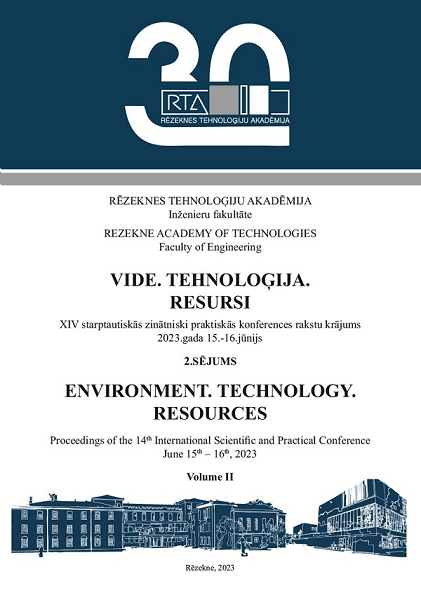DIDACTIC POTENTIAL OF HUMANITIES IN DEVELOPING TRANSFORMATIVE COMPETENCIES AMONG COMPUTER ENGINEERING AND INFORMATION TECHNOLOGY UNDERGRADUATES
DOI:
https://doi.org/10.17770/etr2023vol2.7227Keywords:
activity-based learning, challenge-based learning, Computer Engineering and Information Technology undergraduates, Education 4.0, transformative competenciesAbstract
In the recent decades harnessing the advanced information technologies and their tremendous potential to improve the quality of life for people all over the world is becoming an urgent need than a luxury. Knowing full well that as an innovative student-centred learning paradigm Education 4.0 creates favourable prerequisites for developing valuable professional skills, abilities and knowledge among Computer Engineering and Information Technology undergraduates, the researchers assumed that it also might be effective in preparing them for challenges of the contemporary world through developing their transformative competencies while studying the humanities. The paper aims to reveal the didactic potential of humanities for developing Computer Engineering and Information Technology undergraduates’ transformative competencies. The researchers carried out an exploratory study in five Ukrainian universities using an online survey conceived and developed by a team of researchers. A total of 275 respondents selected by means of a purposeful sampling method took part in the survey. The study found that humanities (1) are more likely to apply various learning activities which can be done both individually and in groups than technical disciplines and (2) have much broader potential for developing all key constructs of transformative competencies among Computer Engineering and Information Technology undergraduates than technical disciplines. The results enabled the researchers to formulate recommendations for university teachers of humanities on how to develop transformative competences among Computer Engineering and Information Technology undergraduates. The combination of challenge-based learning (CBL) and activity-based learning (ABL) is being considered as a major methodological approach of Education 4.0 for developing transformative competences among Computer Engineering and Information Technology undergraduates. Scientific novelty of research consists in revealing and describing the didactic potential of humanities for developing Computer Engineering and Information Technology undergraduates’ transformative competencies.
References
A. A. Hussin, “Education 4.0 Made Simple: Ideas For Teaching,” International Journal or Education & Literacy Studies, 2018, vol. 6, no. 3, pp. 92-98. Available: http://journals.aiac.org.au/index.php/IJELS/article/view/4616/3541. [Accessed: Dec. 14, 2022].
E. B. Moraes, L. M. Kipper, A. C. Hackenhaar Kellermann, L. Austria, P. Leivas, J. A. R. Moraes and M. Witczak, “Integration of Industry 4.0 technologies with Education 4.0: advantages for improvements in learning”, Interactive Technology and Smart education, vol. ahead-of-print no. ahead-of-print, 2022. Available : https://www.researchgate.net/publication/360526523_Integration_of_Industry_40_technologies_with_Education_40_advantages_for_improvements_in_learning [Accessed: Feb. 18, 2023], http://doi.org/10.1108/ITSE-11-2021-0201.
M. Caeiro-Rodríguez et al., “Teaching Soft Skills in Engineering Education: An European Perspective,” in IEEE Access, 2021, vol. 9, pp. 29222-29242, 10.1109/ACCESS.2021.3059516.
L. Alves, P. Ribeiro, R. Machado, “Project-based learning: An environment to prepare IT students for an industry career,” in Computer Systems and Software Engineering: Concepts Methodologies Tools and Applications, Hershey, PA, USA: IGI Global, pp. 1931-1951, 2018. [Online]. Available: https://bibliotecadigital.ipb.pt/bitstream/10198/9861/3/PBLStudIndCareer.pdf. [Accessed: Jan., 20, 2023].
O. Malykhin and N. Aristova, “Improving Computer Engineering and Information Technologies Undergraduate Students’ Training through Combination of Formal, Non-Formal and Informal Learning”, in Proc. ETR International Scientific and Practical Conference, 2019, vol. 2, pp. 208-213, https://doi.org/10.17770/etr2019vol2.4113.
O. Malykhin, N. Aristova, N. Dichek and N. Dyka, “Formation of Top Job Skills of Tomorrow among Computer Engineering and Information Technologies Undergraduate Students in the Process of Learning English”, in Proc. ETR International Scientific and Practical Conference, 2021, vol. 2, pp. 249-254, https://doi.org/10.17770/etr2021vol2.6642.
O. Malykhin, N. Aristova and S. Melikova, “Soft Skills Development Strategies for Computer Engineering and Information Technologies Undergraduate Students Devised in the Process of Learning English”, ETR International Scientific and Practical Conference, 2021, vol. 2, pp. 255-260. https://doi.org/10.17770/etr2021vol2.6602.
J. Tell and M. Hoveskog, “Applied engineering education for soft skills in the context of sustainability and mobility”, International Journal of Sustainability in Higher Education, 2022, vol. 23, no. 8, pp. 324-336, https://doi.org/10.1108/IJSHE-07-2022-0202.
The Organization for Economic Cooperation and Development, “OECD Future of Education and Skills 2030 Concept Note : Transformative Competencies for 2030”, OECD, 2019. [Online]. Available: https://www.oecd.org/education/2030-project/teaching-and-learning/learning/transformative-competencies/Transformative_Competencies_for_2030_concept_note.pdf. [Accessed: Nov. 10, 2022].
The Organization for Economic Cooperation and Development, “The Future of Education and Skills: Education 2030. Position Paper”, OECD, 2018. [Online]. Available: https://www.oecd.org/education/2030/E2030%20Position%20Paper%20(05.04.2018).pdf. [Accessed: Oct., 24, 2022].
The Organization for Economic Cooperation and Development, “OECD Future of Education and Skills 2030: OECD Learning Compass 2030”, OECD, 2019. [Online]. Available: https://www.oecd.org/education/2030-project/teaching-and-learning/learning/learning-compass-2030/OECD_Learning_Compass_2030_Concept_Note_Series.pdf. [Accessed: Nov. 10, 2022].
“Why we need more women in tech by 2030 – and how to do it,” Nov. 3, 2017. [Online]. Available: https://www.weforum.org/agenda/2017/11/women-in-tech-engineering-ellen-stofan/. [Accessed: Dec. 20, 2022].



